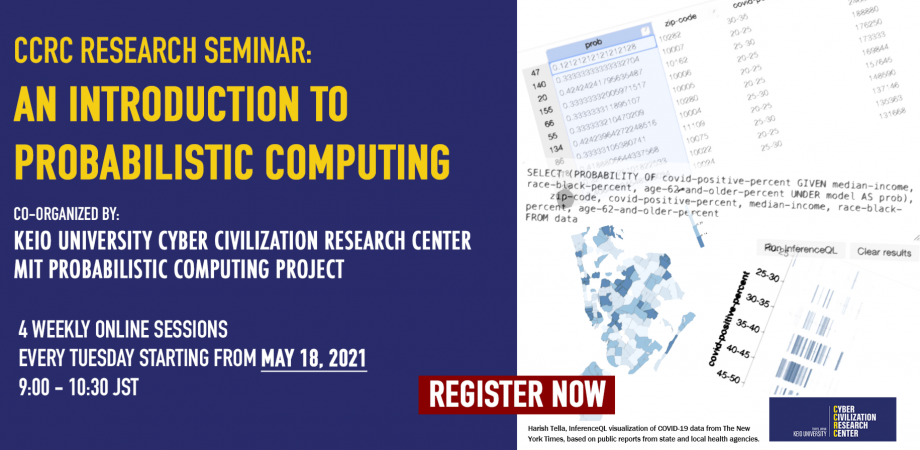#Click here to view the English article
慶應義塾大学 サイバー文明研究センター研究セミナー:
確率コンピューティング入門セミナー
主催:慶應義塾大学サイバー文明研究センター、MIT Probabilistic Computing Team
日時:全4回 5月18日〜6月8日まで毎週火曜日午前9時〜10時30分(日本時間)
言語:英語
参加費:無料
参加資格:機械学習、統計、確率、AI関連の分野のいずれかに精通していること
登録方法: https://ccrc-probabilisticseminar-2021.peatix.com/
締め切り: 5月13日 午後11時50分(日本時間)
概要
確率コンピューティングは、①生成モデリング、②記号的プログラミングやニューラルネットワークを用いた確率的推論、それぞれの良さを組み合わせ、新しいタイプの人工知能(AI)を提示します。応用例としては、自動データモデリング、知識ベース(ドメイン知識を用いた)のデータクリーニング、人間が持つ(だた機械にとっては習得が難しい)常識をモデルに組み込んだ3D画像の理解などがあげられます。本セミナーでは、これらの応用例を調べ、基礎となるアイデア、具体的には、生成プログラムや推論プログラム、データから生成プログラムを学ぶ、メタ生成プログラムの基本的な概念について説明します。これらの技術を体験する実習も行います。
シラバス
5月18日:確率コンピューティングの概要
5月25日:ベイズ的データ前処理
6月1日:データから生成モデルを学習(訓練)する方法
6月8日:自動データモデリングの実習
注意事項
本セミナーは、Zoomを使ったオンラインセミナーです。
Zoomのリンクは、後日参加者にメールで配布されます。
このセミナーを受講することによって単位を取得することはできません。
問い合わせ: 土屋太郎 (taro.f.tsuchiya<at>keio.jp)
講師紹介:
Dr. Freer’s research uses techniques from theoretical computer science, programming languages, and probability to understand the underlying principles of how randomness affects computing, and to explore its implications for building more effective computational systems. His current research focuses on the foundations of probabilistic computing, efficient samplers and testing methods for probabilistic inference, and the mathematics of random structures.
Freer is currently a Research Scientist in the MIT Probabilistic Computing Project. Previously he has held postdoctoral roles in MIT’s Department of Mathematics, Department of Brain and Cognitive Sciences, and Computer Science and Artificial Intelligence Laboratory, and at the University of Hawaii at Manoa. Freer has also been a Lyric Labs Visiting Fellow at Analog Devices, a Research Scientist at Gamalon Labs, and Chief Scientist at Remine. He received his Ph.D. in Mathematics from Harvard University in 2008.
About the MIT Probabilistic Computing Project
We aim to improve our ability to engineer artificial intelligence, reverse-engineer natural intelligence, and deploy applications that increase our collective intelligence and well-being.
Our work integrates probabilistic inference, generative models, and Monte Carlo methods into the building blocks of software, hardware, and other computational systems. For example, we have developed high-level probabilistic programming languages, automated Bayesian data modeling systems, Bayesian inverse graphics approaches to 3D computer vision, and near-optimal algorithms, circuits, and hardware architectures for Monte Carlo. We test our results by collaborating with domain experts on practical applications.
In addition to core academic research and teaching, we mentor engineers and entrepreneurs, develop open source software, and lead hands-on AI workshops for the industry. These activities have led to: VC-backed startups acquired by Salesforce (2012) and Tableau (2018), the founding in 2020 of Common Sense Machines, and a new Intel Center for Probabilistic Computing. We also carry out joint development and field testing with partners from both the public and private sectors.
 Contact us
Contact us
